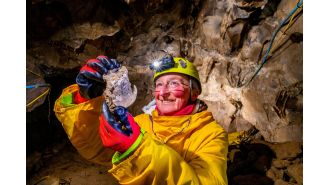My son's lack of sleep was so hard—it nearly broke me by the time he was four.
Parenthood can lead to sleepless nights, but the effects can be serious.

Ivana Poku was struggling. She was a mother of twins and was getting only three hours of broken sleep every night. She was so exhausted that one day, as she was strapping her baby son Henry into his high chair, she felt an urge to hurt him. She quickly put him in the chair, locked herself in her bedroom, and called her husband. Thankfully, a friend of hers arrived and found her sobbing on the bed.
Sleep deprivation is a serious problem for parents, and can have devastating mental and physical effects. The Suicide and Maternal Mortality report in the National Library of Medicine, worldwide, claims suicide to be a leading cause of death in the perinatal period, and sleep deprivation is cited as a large trigger. Ivana was scared she might harm her children due to her sleep deprivation. She was feeling hopeless and that no one was there to help her.
The couple tried the cry it out method, where an infant is left to cry and checked in on at regular intervals, and it worked. Ivana was relieved, as she knew things could have ended tragically for them.
Ann-Marie Kinlock, 45, had a similar experience. Her son didn't sleep until he was four and would wake three to four times a night. This led to her suffering from severe sleep deprivation and affected her mental health. She even had to give up her career in advertising because she couldn't cope on the little sleep she got.
Ann-Marie believes that there needs to be a dramatic overhaul in the support offered to struggling parents. She feels that help and advice for your child's sleep should be accessible and free, but unfortunately, the NHS is too underfunded to offer this kind of support. Georgina Sturmer, a counsellor who works with new parents, agrees and believes that the NHS is sadly just too stretched to be able to offer parents the kind of sleep support they need.
Ivana Poku knew she had to get away from her baby son, Henry. She felt a headache pulsating behind her tired eyes, and worse, an urge to harm him. She had been struggling through sleepless nights since the birth of her twin sons, Mason and Henry, and she just couldn't take it anymore. She strapped him into his high chair and locked herself in her bedroom, calling her husband in desperation. It was then that she realised how serious the mental and physical toll of parental sleep deprivation can be.
Sleep deprivation has serious consequences, even leading to suicide, according to the Suicide and Maternal Mortality report in the National Library of Medicine, worldwide. Ivana was scared that she might harm her children due to the lack of sleep she was getting. She had intrusive thoughts that everyone would be better off without her and felt like a burden on her husband and family.
Ivana had reached out for help, but her health visitors would tell her to just give it time. She felt brushed off and it wasn't until her friend showed up that she realised they needed to sort out the twins' sleep. After a lot of hard work, they managed to get them to sleep through the night with the cry it out method.
Ann-Marie Kinlock, 45, also experienced the devastating effects of sleep deprivation when her son was born. He didn't sleep until he was four and would wake up three to four times a night, driving her crazy and making her feel like she was doing something wrong. She had to give up her career in advertising because she couldn't cope on the little sleep she was getting.
The lack of support for parents struggling with sleep deprivation is a huge issue. Ann-Marie reached out for help, but the only thing she was offered was talking therapy, which wouldn't help her son sleep better. Georgina Sturmer, a counsellor who volunteers with Home-Start, believes that while the NHS should offer tailored approaches to parents in need, it is sadly too underfunded to do so.
The mental and physical toll of sleep deprivation on parents can be devastating. Ivana and Ann-Marie's stories are a perfect example of this, and it is clear that more needs to be done to help parents in need. Hopefully one day, the NHS will be able to offer the kind of support that parents need to get through this difficult period.
9 Views









